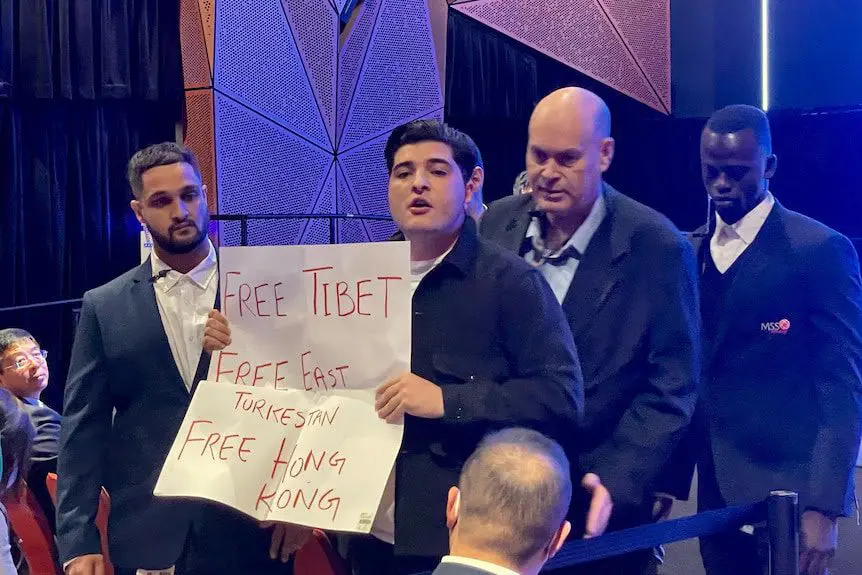By Shyamal Sinha
Xiao Qian gave an address to the Australia-China Relations Institute at the University of Technology in Sydney on Friday.
Mr Xiao, who was appointed to his diplomatic post in January, used his speech to reframe the relationship between the two nations.
He said there was “good potential for co-operation” between Canberra and Beijing in the near future following the change in government.
“After the recent federal election, Australia has a new Labor government. This is a choice for the Australian people and it’s a domestic affair of this country,” he said.
“Nonetheless, it has provided with an opportunity of possible improvement of our bilateral relations.”
The ambassador’s speech comes after months of mounting uneasiness in the Pacific over China’s expansion into the region, fuelled by the signing of a controversial security pact with Solomon Islands.
Mr Xiao did not in his speech address the Solomon Islands directly but said China’s development should be viewed as an “opportunity” rather than a “so-called threat to Australia”.
“And there is every reason for China and Australia to be friends and partners rather than adversaries or even so-called enemies,” he said.
Dhongdue carried a placard that read, “Free Tibet, Free East Turkestan, Free Hong Kong” as she shouted the same slogans while being ushered out of the hall by security personnel.
“This is the representative of a dictatorship with one million Muslims in concentration camps. Uyghur Muslims are being raped and tortured as we speak. [It is the same dictatorship] that commits genocide against Tibetans,” vocal Australian activist Drew Pavlou shouted. Another protestor shouted, “This is disgraceful! How about freedom of speech in China?” as he walked out of the room.
 Activist Drew Pavlou holds sign and shouts ‘Free Uyghurs’ during the ambassador Xiao’s speech on Friday (Photo/ABC News)Both Kyinzom Dhongdue and Drew Pavlou are founders and members of a new political party in Australia, the Democratic Alliance. Dhongdue and Pavlou both ran for Senate but did not to win enough votes for office.
Activist Drew Pavlou holds sign and shouts ‘Free Uyghurs’ during the ambassador Xiao’s speech on Friday (Photo/ABC News)Both Kyinzom Dhongdue and Drew Pavlou are founders and members of a new political party in Australia, the Democratic Alliance. Dhongdue and Pavlou both ran for Senate but did not to win enough votes for office.
As a snide remark in response, Xiao said that it was his pleasure to address the event “although there are different views” which “should be expressed in a way that is appropriate”. He went on to say that the audience members “should respect the law and order” and “keep quiet while we’re speaking”.
China’s ambassador to Australia, however, said that there is “no such thing as absolute freedom” as he defended his country’s human rights violations. As he was facing repeated interruptions from activists, the envoy also said both the countries, China and Australia, should respect each other’s “sovereignty and territorial integrity”.
The diplomatic suspension between the Canberra and Beijing governments started during the pandemic when PM Scott Morrison called for the initial international investigation into the origins of Covid-19 in 2020. The Chinese government was outraged due to the probe, which eventually led to the trade barriers being enforced on Australian imports, including meat, wine and coal.
Protesters also raised the large-scale detention of the Uyghur ethnic minority group in China’s northwestern province of Xinjiang.
Mr Xiao said what was happening in Xianjang was a question of “national unity” rather than one of separatism and that “necessary measures have been taken”.
Following his speech, the ambassador took part in a Q+A-style discussion with Australia-China Relations Institute director, James Laurenceson.
Professor Laurenceson was effusive when thanking Mr Xiao for his participation in Friday’s event.
“The easiest thing in the world for the ambassador to have done today would have been to not accept our invitation to attend a public event,” he said.
“He could have stayed in the walls of the Chinese Embassy in Canberra comfortably.”






